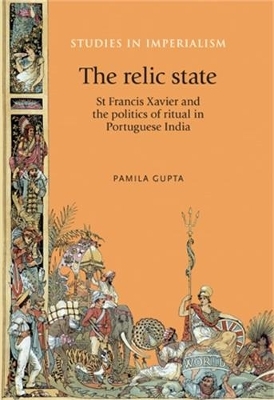
The Relic State
St Francis Xavier and the Politics of Ritual in Portuguese India
Seiten
2014
Manchester University Press (Verlag)
978-0-7190-9061-5 (ISBN)
Manchester University Press (Verlag)
978-0-7190-9061-5 (ISBN)
Explores the evolving shape of a series of Catholic festivals that took place throughout the duration of Portuguese colonial rule in Goa (1510–1961) -- .
This book is a study of the complex nature of colonial and missionary power in Portuguese India. Written as a historical ethnography, it explores the evolving shape of a series of Catholic festivals that took place throughout the duration of Portuguese colonial rule in Goa (1510–1961), and for which the centrepiece was the 'incorrupt' corpse of São Francisco Xavier (1506–52), a Spanish Basque Jesuit missionary-turned-saint. Using distinct genres of source materials produced over the long duree of Portuguese colonialism, the book documents the historical and visual transformation of Xavier’s corporeal ritualisation in death through six events staged at critical junctures between 1554 and 1961. Xavier’s very mutability as a religious, political and cultural symbol in Portuguese India will also suggest his continuing role as a symbol of Goa’s shared past (for both Catholics and Hindus) and in shaping Goa’s culturally distinct representation within the larger Indian nation-state. -- .
This book is a study of the complex nature of colonial and missionary power in Portuguese India. Written as a historical ethnography, it explores the evolving shape of a series of Catholic festivals that took place throughout the duration of Portuguese colonial rule in Goa (1510–1961), and for which the centrepiece was the 'incorrupt' corpse of São Francisco Xavier (1506–52), a Spanish Basque Jesuit missionary-turned-saint. Using distinct genres of source materials produced over the long duree of Portuguese colonialism, the book documents the historical and visual transformation of Xavier’s corporeal ritualisation in death through six events staged at critical junctures between 1554 and 1961. Xavier’s very mutability as a religious, political and cultural symbol in Portuguese India will also suggest his continuing role as a symbol of Goa’s shared past (for both Catholics and Hindus) and in shaping Goa’s culturally distinct representation within the larger Indian nation-state. -- .
Pamila Gupta is Senior Researcher at WISER (Wits Institute for Social and Economic Research) at the University of the Witwatersrand in Johannesburg, South Africa -- .
1. Introduction: The relic state
2. Incorruption (1554)
3. Canonisation (1624)
4. Secularisation (1782)
5. Resurrection (1859)
6. Commemoration (1952)
7. Conclusion: Xavier and the Portuguese colonial legacy
Bibliography
Index -- .
| Erscheint lt. Verlag | 31.8.2014 |
|---|---|
| Reihe/Serie | Studies in Imperialism |
| Zusatzinfo | Illustrations, black & white |
| Verlagsort | Manchester |
| Sprache | englisch |
| Maße | 156 x 234 mm |
| Gewicht | 612 g |
| Themenwelt | Geisteswissenschaften ► Geschichte ► Regional- / Ländergeschichte |
| Geschichte ► Teilgebiete der Geschichte ► Wirtschaftsgeschichte | |
| Religion / Theologie ► Christentum ► Liturgik / Homiletik | |
| ISBN-10 | 0-7190-9061-X / 071909061X |
| ISBN-13 | 978-0-7190-9061-5 / 9780719090615 |
| Zustand | Neuware |
| Haben Sie eine Frage zum Produkt? |
Mehr entdecken
aus dem Bereich
aus dem Bereich
die Ukraine, Polen und der Irrweg in der russischen Geschichte
Buch | Hardcover (2023)
C.H.Beck (Verlag)
28,00 €
eine Globalgeschichte des Kapitalismus
Buch | Hardcover (2023)
C.H.Beck (Verlag)
38,00 €


